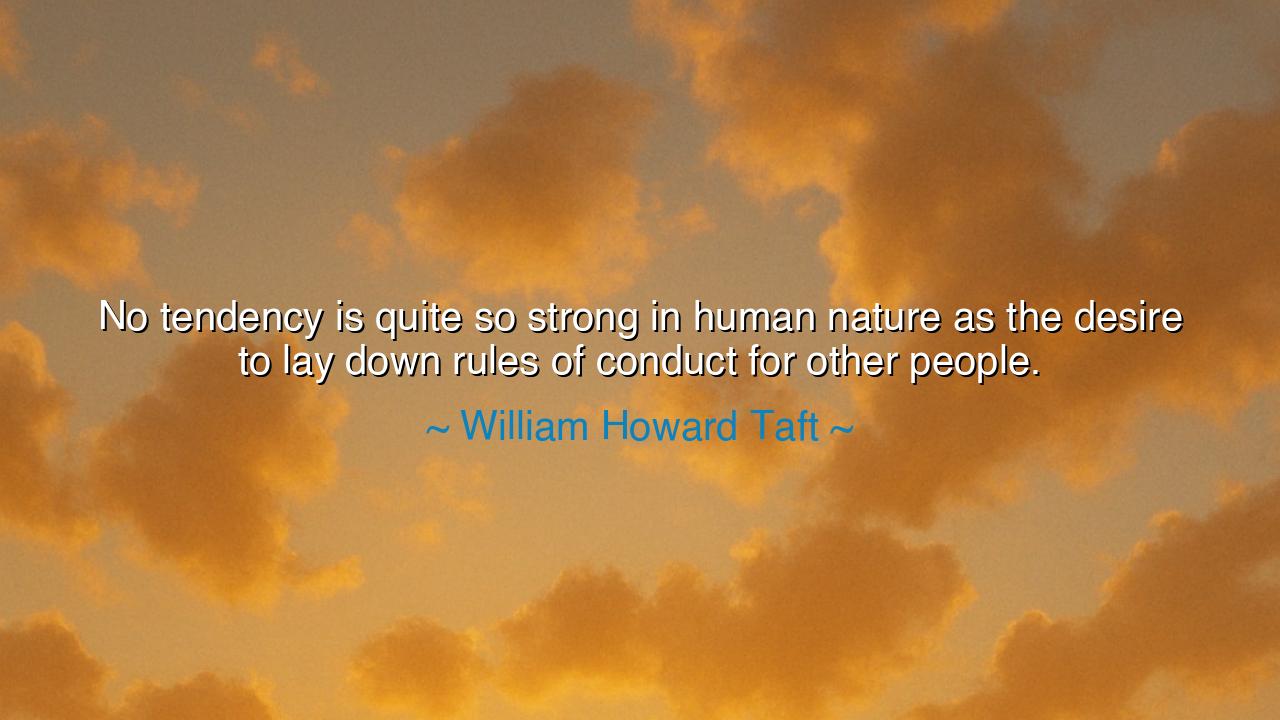
No tendency is quite so strong in human nature as the desire to
No tendency is quite so strong in human nature as the desire to lay down rules of conduct for other people.






When William Howard Taft declared, “No tendency is quite so strong in human nature as the desire to lay down rules of conduct for other people,” he spoke as one who had seen both the courtroom and the presidency, who had witnessed firsthand the endless human impulse to govern not only oneself, but the lives of others. His words cut to the heart of a paradox that runs through history: men often resist rules for themselves, yet burn with zeal to prescribe them for their neighbors. It is a tendency born of pride, of the illusion that one’s own vision of righteousness is sufficient to bind the conduct of the world.
The origin of this truth lies deep in the nature of humanity. From the earliest tribes, leaders rose not merely to protect but to command, to decree laws of speech, dress, worship, and behavior. Sometimes these rules preserved harmony; other times they crushed freedom beneath their weight. Taft, both as President and later as Chief Justice, understood how law, when wielded with humility, can guide a nation. Yet he also knew the peril: when individuals, factions, or governments become too eager to impose their moral will upon others, liberty itself is imperiled.
History abounds with examples. Consider the Puritans of New England, who fled Europe seeking religious freedom, only to impose upon their own communities a rigid code of faith and practice. They escaped tyranny, and yet they became tyrants themselves, exiling dissenters and punishing those who worshiped differently. Their story reveals what Taft’s words warn us against: the strong tendency in human nature to assume that one’s own path must be universal law.
The ancients, too, perceived this weakness. Plato, in his Republic, envisioned philosopher-kings who would dictate every aspect of society, from marriage to music. Yet even as he praised order, other voices like Laozi in the East taught the opposite: that the more laws and prohibitions a ruler creates, the more disorder will flourish. Between these two poles lies the eternal struggle of governance—how to balance the natural desire to rule with the higher wisdom of restraint.
The meaning of Taft’s words is both sobering and instructive. He reminds us that this tendency is not confined to kings or judges; it dwells in all of us. How often do we lay down rules in our own households, in our workplaces, in our friendships, dictating how others should live, while excusing our own lapses? The impulse to command is seductive because it flatters the ego, giving the illusion of superiority. Yet it can poison relationships, corrupt nations, and blind us to the humility required to govern even ourselves.
The lesson for us is clear: beware the eagerness to control others, and master first the governance of the self. The greatest leaders in history—such as George Washington, who voluntarily surrendered power after two terms—were those who restrained their own will to dominate. They taught that the true measure of greatness is not in ruling others harshly, but in setting an example of discipline and justice that inspires others to follow willingly.
Practically, we can live this teaching by cultivating humility in our judgments. Before laying down rules for others, ask whether we ourselves live by the standards we preach. When tempted to impose, let us instead inspire. When inclined to command, let us choose to guide. And when rules must be made, let them be few, just, and tempered with mercy.
Thus, Taft’s words endure as a warning and a guide: the desire to rule others is among the strongest in human nature, but the noblest task is to rule oneself. Let us then turn our energy inward, shaping our own conduct as an offering to the world, and in so doing, we may lead not by force, but by the quiet authority of example.






AAdministratorAdministrator
Welcome, honored guests. Please leave a comment, we will respond soon